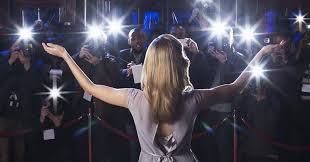The importance of celebrities, especially in the daily lives of growing adolescents and young adults, has grown significantly over the last decade. The introduction of smartphones started with the Iphone in 2007 with Android releasing their phones in 2008. The concept exploded in popularity in 2010’s with them being normalized in 2012-2013. Its computer-styled layout and the ability to have access to the internet contained within a pocket-sized convenience was revolutionary for its time. With these devices came the rise of the internet through cellular apps, laying the groundwork of connections between the influential and the common people.
According to thesciencesurvey.com, almost a year ago, Taylor Swift posted on instagram announcing to her followers: “I’ve been so lucky to see so many of you guys at my U.S. shows recently. I’ve heard you raise your voices, and I know how powerful they are,” Vote.org, a few hours later, saw over 35,000 registrators, marking the highest turnout since 2020. The significance of the role of celebrities in shaping public opinion during elections has been evident through the use of younger generations, and with this election having an additional 8+ million Gen Z voters, adding to around a total of 41 million Gen Z eligible voters. As a generation that has been raised by the exposure of social media, it’s pretty clear that the leverages of online platforms can help shape political opinions and mobilize voters.
The rise of social media continued to increase the influence of celebrities on the common people. Platforms such as Instagram, Twitter, and Tiktok, where content is mainly based on the lives and opinions of other people including the influential, draws a clearer bridge between the general public and the people they look up to. Sophomore, Mac Kosal agrees that the exponential exposure of social media to Gen Z will heavily influence the 2024 election.
“Growing up with social media, I think that we were the first generation to like fully grow up with social media and technology,” said Kosal. “We’ve kind of been just used to kind of this influencer culture and a lot of us have just been surrounded by it, and so I think it’ll really affect us.”
The main cause of undecided voters in any election is the lack of information. Many voters are not fully informed about candidates, their policies, or the issues at stake, causing uncertainty about whom to support. However, using social media as their outlet, celebrities and other influential affluent figures are able to positively inform the public, especially young voters, about candidates and their respective policies. Individuals often resonate with the celebrities they admire; therefore, when a celebrity actively endorses a political candidate, it may encourage their followers to take the final step of casting their votes for that particular candidate. Alex Truong, Sophomore, agrees that celebrities endorsing candidates can sway undecided voters.
“Well, with undecided voters, they don’t know who to vote. So if a celebrity endorses [a candidate] and they like that celebrity, they might just vote [them],” said Truong.
Although entities of influence may be positive for introducing new perspectives and informing the public, celebrities can cause voters to make these decisions blindly. For example, people that see a celebrity that they identify with saying to vote for a candidate can make those people vote blindly without knowing about the candidate’s values or policies. Anthony Dang, Sophomore, agrees that celebrities endorsing candidates can negatively affect the political integrity of voters.
“The people who do vote a nominee because of a celebrity, they’re just not aware of that. They just only blindly vote most of the time […] because they trust their favorite celebrity a lot,” said Dang.
While the effect of voting without proper consideration due to a celebrity’s influence is a concern, it remains a relatively minor issue. Even if it distracts from important issues such as the candidate they’re voting for themselves, Amy Husk, AP World History teacher, argues that it’s almost unpreventable. She states that in a democracy where people have the power for the decision of a leader, they’re going to be influenced by other people’s opinions and values, celebrities or not.
“People who are just going off of voting because a celebrity told them to, and not necessarily on the issues, I think that could be a problem. But those are just some of the problems that you face in a democracy,” said Husk. “You have people that have more influence [over] others, and that’s just something that we can’t escape.”
The rise of social media has drastically transformed the political landscape, rapidly increasing the influence of celebrities in unprecedented ways. As public figures with extensive reach and appeal, celebrities have the power to shape political discourse, mobilize supporters, and raise awareness about critical issues. This influence can lead to positive outcomes, such as increased voter engagement and the ability to bring diverse perspectives to the forefront of political discussions. Though there are drawbacks that follow it, such as blindly voting from the opinions of the affluent. Despite what others may argue, the impact of celebrities through social media is apparent, and will not only affect the 2024 elections, but also the further elections that come along the way as long as the country continues to unite under a democracy.

